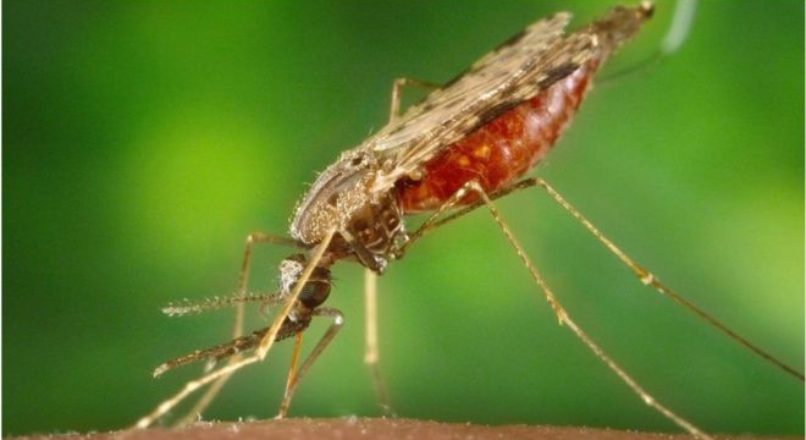
Vijiumbe vya kisayansi vinaweza kufanya kazi kikamilifu kama chanjo ya Malaria
Wanasayansi wamegundua microbe ambayo hulinda mbu kabisa dhidi ya kuambukizwa na malaria.
Timu ya Kenya na Uingereza inasema matokeo hayo yamepatikana “uwezo mkubwa” kudhibiti ugonjwa huo na inaweza kutumika kama chanjo ya malaria.
Malaria huenezwa kwa kuumwa na mbu, hivyo kuwalinda kunaweza kuwalinda watu.
Watafiti sasa wanachunguza ikiwa wanaweza kumwachilia mbu walioambukizwa porini, au kutumia spores kukandamiza ugonjwa huo.

Malaria huenezwa kwa kuumwa na mbu
Microbe hii ni nini?
Mdudu wa kuzuia malaria, Microsporidia MB, iligunduliwa kwa kutafiti mbu kwenye ufuo wa Ziwa Victoria nchini Kenya. Inaishi kwenye utumbo na sehemu za siri za wadudu.
Watafiti hawakuweza kupata mbu hata mmoja aliyebeba Microsporidia ambaye alikuwa akihifadhi vimelea vya malaria.. Na majaribio ya maabara, iliyochapishwa katika Mawasiliano ya Mazingira, alithibitisha microbe hiyo iliwapa mbu ulinzi.
Microsporidias ni fungi, au angalau uhusiano wa karibu nao, na wengi ni vimelea.
Walakini, spishi hii mpya inaweza kuwa na faida kwa mbu na ilipatikana kwa asili karibu 5% ya wadudu waliojifunza.
Ugunduzi ni mkubwa kiasi gani?
“Data tuliyo nayo hadi sasa inapendekeza ni 100% kizuizi, ni kizuizi kikali sana cha malaria,” Dk Jeremy Herren, kutoka Kituo cha Kimataifa cha Fiziolojia ya Wadudu na Ikolojia (pipi) nchini Kenya aliambia BBC.
lakini kila moja peke yake mara nyingi haijumuishi mengi: “Itakuja kama mshangao mkubwa. Nadhani watu watapata mafanikio makubwa sana.”
Zaidi ya 400,000 watu wanauawa na malaria kila mwaka, wengi wao wakiwa watoto chini ya umri wa miaka mitano.
Wakati mafanikio makubwa yamepatikana kupitia matumizi ya vyandarua na kunyunyuzia dawa majumbani, hii imekwama katika miaka ya hivi karibuni. Inakubaliwa na wengi kuwa zana mpya zinahitajika ili kukabiliana na malaria.

Vyandarua vimesaidia kupunguza idadi ya watu walioambukizwa malaria duniani kote
Je, vimelea huzuiaje malaria?
Maelezo mazuri bado yanahitaji kufanyiwa kazi.
Lakini Microsporidia MB inaweza kuwa inaanzisha mfumo wa kinga ya mbu, hivyo ina uwezo zaidi wa kupambana na maambukizi.
Au uwepo wa vijidudu kwenye wadudu unaweza kuwa na athari kubwa kwenye kimetaboliki ya mbu., na kuifanya kuwa duni kwa vimelea vya malaria.
Maambukizi ya Microsporidia MB yanaonekana kuwa ya muda mrefu. Ikiwa chochote, majaribio yanaonyesha kuwa makali zaidi, hivyo athari ya kuzuia malaria ingekuwa ya muda mrefu.
Hii inaweza kutumika lini dhidi ya malaria?
Angalau, 40% mbu katika eneo fulani wanahitaji kuambukizwa Microsporidia ili kufanya denti kubwa katika malaria..
Kiini hicho kinaweza kupitishwa kati ya mbu wakubwa na pia hupitishwa kutoka kwa jike hadi kwa watoto wake.
Kwa hivyo, watafiti wanachunguza mikakati miwili mikuu ya kuongeza idadi ya mbu walioambukizwa.
- Microsporidia huunda spora ambazo zinaweza kutolewa kwa wingi ili kuambukiza mbu
- Mbu dume (ambayo haiuma) inaweza kuambukizwa katika maabara na kutolewa porini ili kuwaambukiza wanawake wanapofanya ngono
“Ni ugunduzi mpya. Tumefurahishwa sana na uwezo wake wa kudhibiti malaria. Ina uwezo mkubwa sana,” Prof Steven Sinkins, kutoka MRC-Chuo Kikuu cha Glasgow Kituo cha Utafiti wa Virusi, aliambia BBC.
Dhana hii ya udhibiti wa magonjwa kwa kutumia vijidudu haijawahi kutokea. Aina ya bakteria inayoitwa Wolbachia imeonyeshwa kufanya iwe vigumu kwa mbu kueneza homa ya dengue katika majaribio ya ulimwengu halisi..
Wanasayansi wanahitaji kuelewa jinsi microbe huenea, kwa hivyo wanapanga kufanya majaribio zaidi nchini Kenya.
Walakini, mbinu hizi hazina ubishi kwani spishi hiyo tayari inapatikana kwa mbu wa mwituni na haileti kitu kipya..
Pia isingeua mbu, kwa hivyo haitakuwa na athari kwa mifumo ikolojia inayoitegemea kama chakula. Hii ni sehemu ya mikakati mingine kama vile Kuvu muuaji ambayo inaweza karibu kuharibu kabisa idadi ya mbu katika wiki..
Mikopo:
https://www.bbc.com/news/health-52530828


Acha jibu
Lazima Ingia au kujiandikisha kuongeza maoni mapya .